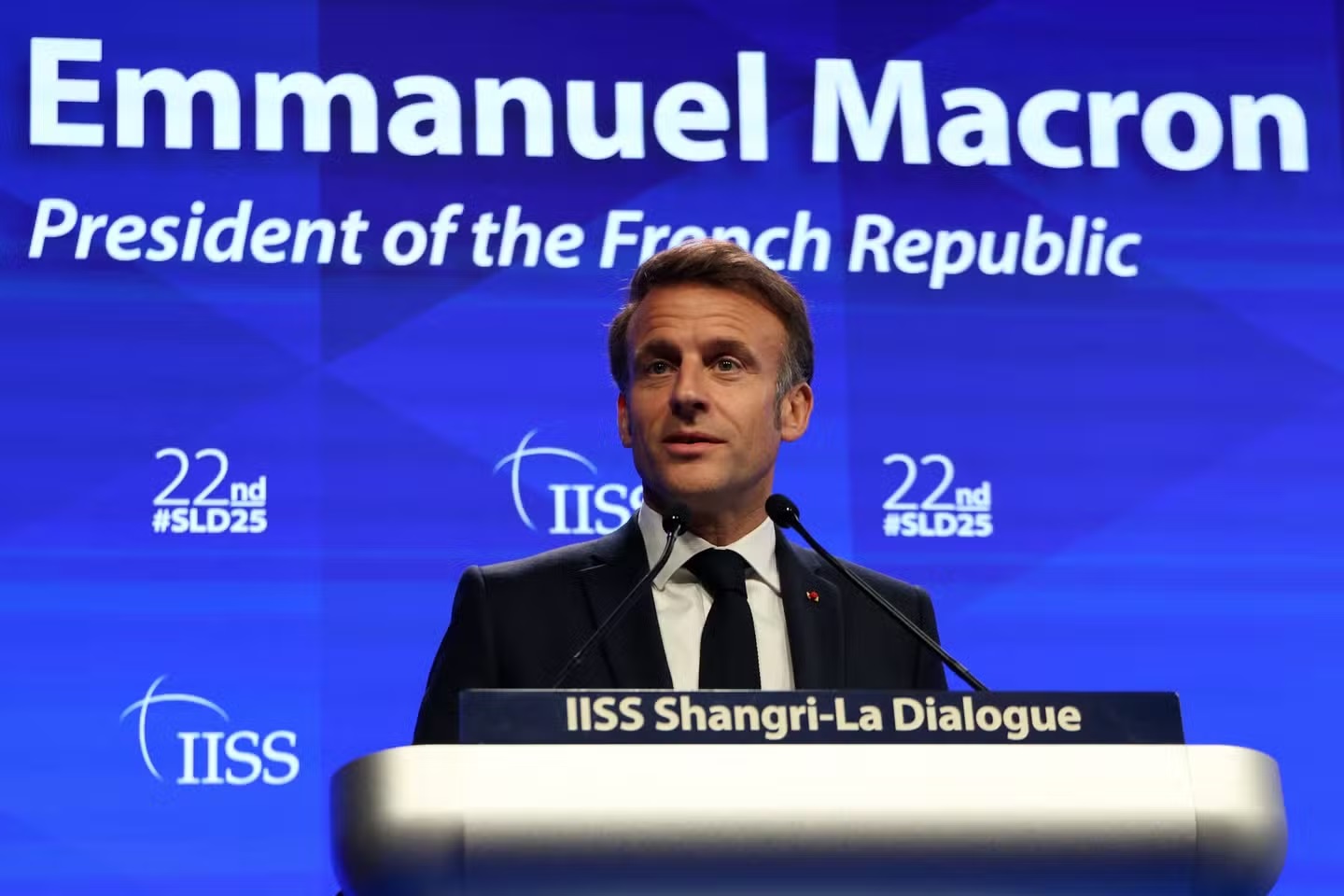French President Emmanuel Macron on Friday, May 30, 2025, called for a “positive new alliance” between European and Asian nations.
He urged them to come together based on shared values of security, defense, and trade, independent of the ongoing rivalry between the United States and China.
Speaking at the Shangri-La Dialogue, a major security summit held in Singapore on Friday, Macron stressed that the escalating tensions between Washington and Beijing represent the most significant threat to global stability today.
He also highlighted the dangers posed by Russia and North Korea.
Macron further emphasized that like-minded countries must coordinate more effectively to uphold international credibility and deter aggressors.
“We are in an era of crisis, and this calls for new forms of cooperation,” Macron said in his keynote address.
“The primary challenge before us is how to safeguard peace, stability, and prosperity amid the current geopolitical environment.”
He warned against so-called revisionist powers seeking to impose control through coercion, framing it as a struggle over influence.
Macron criticized nations aiming to dominate regions ranging from Europe’s borders to the South China Sea by monopolizing resources, such as minerals and fisheries, and marginalizing others.
One of the core themes of Macron’s address was opposition to a global divide driven by superpower competition.
He cautioned against a simplistic binary approach:
“A world split between two powers, where everyone else is expected to pick a side, undermines the international order.
“It threatens to dismantle institutions built after World War II to preserve peace,” Macron added.
While reaffirming France’s friendship and alliance with the United States, Macron was clear that France sought autonomy in its strategic decisions.
He also stated that France did not want to be overly influenced by the choices of any single leader or country.
“We are witnessing the erosion of long-standing alliances,” he said.
“The perception that these commitments may no longer be absolute is contributing to a new wave of global instability.
“We see this happening around us every day.”
Despite these remarks, Macron acknowledged that the U.S. under Donald Trump was justified in asking its allies to assume more responsibility for their own defense.
“That request was fair,” he said. “We do need Europeans to take greater charge of their security.”
Notably present during Macron’s address was U.S. Defense Secretary Pete Hegseth, who earlier this year criticized European nations as “pathetic.”
He had also accused them of “freeloading” in a Signal chat with fellow Trump officials, a message that was later leaked.
Macron also criticized the West’s inconsistent handling of international crises.
He cited, particularly, the prolonged war in Ukraine and its perceived leniency toward Israel regarding the Gaza conflict.
He warned that such inconsistencies could erode the West’s standing and undermine efforts to maintain a rules-based global order.
“Our credibility in defending the global order is at stake,” he declared.
Earlier the same day, Macron had urged European nations to adopt a tougher collective stance on Israel, especially if the humanitarian crisis in Gaza does not improve.
The UN has warned that Gaza’s entire population is at risk of famine. Macron’s remarks triggered a strong response from Israel.
Defense Minister Israel Katz accused the French president of launching a “crusade against the Jewish state.”
He also reaffirmed Israel’s intention to build a “Jewish Israeli state” in the occupied West Bank, a direct message to Macron and his allies.
The Shangri-La Dialogue is a key gathering of defense officials and policymakers from around the world.
It features speeches, panel discussions, and behind-the-scenes negotiations over three days.
U.S. Defense Secretary Hegseth is scheduled to deliver his own speech on Saturday.
Typically, the forum hosts important bilateral meetings.
Last year, it was the venue for discussions between then-U.S. Defense Secretary Lloyd Austin and Chinese Defense Minister Dong Jun.
However, this year China sent only a single delegate from its National Defense University, marking the first time since 2019 that Beijing did not dispatch its defense minister.
This absence has sparked speculation amid worsening U.S.-China relations since Trump returned to office.
Many military-to-military channels have been cut, and some experts see Beijing’s decision to send a smaller delegation as a missed chance to build trust with skeptical nations.
Zhou Bo, a retired senior Chinese military officer at the conference, dismissed concerns over the delegation size and rumors that Dong was under investigation for corruption, stating that the minister was traveling overseas.
“The world won’t change just because China’s defense minister isn’t attending,” Zhou said.
“There are still plenty of other venues for China to present its views.”







